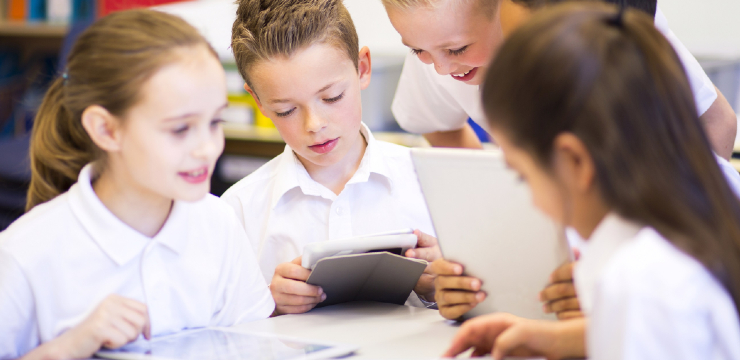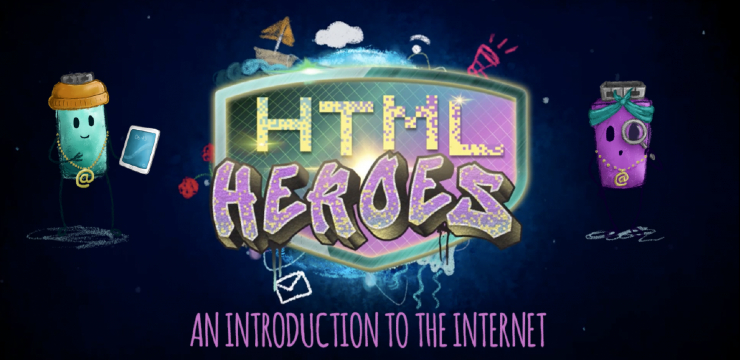Introducing Online Safety to the Primary Classroom – Considerations for Teachers
 Pupils are increasingly accessing the internet and digital technologies from a younger age, and the online world is very much part of their lives. The internet and digital media provide children with many benefits including helping them to communicate, learn and create, but it also presents challenges. Schools and teachers play a vital role in engaging children in online safety and helping them to develop key digital literacy skills that will equip them with the knowledge to use the internet and technology in a safe and effective way.
Pupils are increasingly accessing the internet and digital technologies from a younger age, and the online world is very much part of their lives. The internet and digital media provide children with many benefits including helping them to communicate, learn and create, but it also presents challenges. Schools and teachers play a vital role in engaging children in online safety and helping them to develop key digital literacy skills that will equip them with the knowledge to use the internet and technology in a safe and effective way.
Introducing online safety to the primary school classroom will help pupils to develop the skills to use technology safely and responsibly, and provide them with the opportunity to make the most of the benefits it provides.
When introducing online safety to the primary school classroom here are some considerations for teachers to take into account.
Ascertain Pupil’s Levels of Engagement with Various Online Tools
Before beginning any discussions on the internet, teachers are advised to ascertain what levels of engagement pupils have with various online tools, and to adapt the delivery of online safety lessons accordingly. For example, a school might survey teachers, parents and/or pupils to find out if they play online games or use messaging apps. Teachers can select from relevant lessons and activities within internet safety programmes to best suit the needs of the class based on their engagement with digital technology. All of the Webwise teaching resources can be accessed here.
Discussing Online Activities
It’s important to recognise that pupil’s level of engagement and experience with digital technologies and the internet will vary. Every family is different, and they will have different rules in place for their children. Given the varying experiences they will have, when discussing internet safety with pupils it is important to focus on the online activity rather than on specific online services. Try to focus discussions on the needs that motivate pupils to use the internet and not on the tools they use to achieve these goals. In general, children use the internet to socialise, to share media, to find information, to play games, to communicate and to learn. Be mindful that children’s engagement with the online world may vary, for example some pupils will have more experience of playing online or using devices to watch online videos, and some may be interested in using social media apps for the first time. Many of them will be haggling with their parents for permission to do this. Your words may be brought home and used as part of these negotiations. In this context, it’s better to talk about “playing online” than “using Roblox or Fortnite”, or “sharing photos” instead of “using Instagram.
Age Restrictions Online – What Do I Need to Know?
Before introducing new technology or apps for learning, it is important to consider the age of the students. Check your school policy, the terms of service, age requirements and appropriateness of the platform.
Most social media platforms and services have a minimum age requirement; for the majority of these services, it is 13 years old and some are set at 16 (WhatsApp). Therefore technically, children under the age of 13 should not have a social media account. However most social media platforms do not have robust age-verifications in place, making it easy for children to sign-up. Under the new E.U General Data Protection Regulation (GDPR), Ireland has now set the Digital Age of Consent to 16 years old. This is the age at which children can legally consent to companies/organisations processing their personal data or information for example when you sign up to an online platform or social media account. For children under the age of 16, consent must be given/authorised by the parent or guardian of the child. For the purposes of data collection, teenagers between the age of 13 and 16 years old must have parental permission to sign-up to social media services.
Age restrictions on online games vary, although most online games have a PEGI Rating. Age ratings are systems used to ensure that entertainment content, such as games, and also films, tv shows or mobile apps, is clearly labelled with a minimum age recommendation based on the content they have. These age ratings provide guidance to consumers, parents in particular, to help them decide whether or not to buy a particular product for a child.
There is no age restriction for watching videos on YouTube, but users need to be 13 or older to have their own YouTube account (enabling them to subscribe to other channels, like videos, post comments, share their own content and flag inappropriate content). It is recommended that any internet use for young children is supervised and child friendly sites are used. We advise children to wait until the required age before joining any service. Parents should be aware of age restrictions and they also have an important role to play to help prepare their children to go online. Schools can draw parents’ attention to the supports available to them on webwise.ie/parents by placing a link on their school’s website or circulating the Webwise Parents’ Guide to a Better Internet booklet to the parent’s association. For more info visit: webwise.ie/parents.
School Policies
Teachers should familiarise themselves with the relevant school policies including; Acceptable Use Policy, Anti-Bullying Policy, Bring Your Own Device (BYOD) Policy, Child Safeguarding Statement, Code of Behaviour, Privacy/ GDPR Policy, etc. Be aware of all the supports that are available to you and to the pupils in your school. It is important to be well informed on the school’s relevant policies, and to ensure that pupils are familiar with the Acceptable Use Policy, Codes of Behaviour and other rules and policies as appropriate.
Anti-Bullying Procedures
All schools are required to formally adopt and implement an Anti-Bullying Policy that fully complies with the requirements of the AntiBullying Procedures. Before introducing online safety lessons to the classroom, familiarise yourself with the school’s AntiBullying Policy and make pupils aware of the school’s procedures.
Embedding Digital Technologies
When exploring internet safety to primary classroom, schools with access to digital devices (e.g. tablets, laptops, cameras) can introduce digital technology by capturing responses on discussion activities using a variety of web-based tools and apps (e.g. Google Docs, Microsoft Word, Mentimeter, Kahoot, Flipgrid etc.). They can also use digital voice recording tools (e.g. Vocaroo, Chatterpix, Flipgrid, Anchor, microphone tool on Seesaw etc.) to capture pupils’ oral responses. Creative and graphic design digital tools (e.g. Adobe Spark Post, Animaker, Canva etc.) can be used for arts-based activities such as creating posters. Digital content creation tools (e.g. Write Reader, Book Creator, Keynote, Google Slides, Microsoft Powerpoint etc.), provide opportunities for pupils to draft, edit and publish their writing genre work or showcase their understanding of a topic in the format of a multimedia presentation. This is not an exhaustive list. Digital technologies can be integrated in many ways and pupils’ work can be saved on their digital portfolio platforms as evidence of their knowledge, understanding and engagement. More information on using digital technologies can be found here: pdst.ie/DistanceLearning/onlinetools.
Distance Learning Considerations
 With more learning and education taking place online, there are some key considerations that schools should factor into their plans to ensure a safe learning experience for students and teachers. Along with technical considerations, safeguarding children should form a part of the planning stages of any changes/updates to learning environments. For more information visit
With more learning and education taking place online, there are some key considerations that schools should factor into their plans to ensure a safe learning experience for students and teachers. Along with technical considerations, safeguarding children should form a part of the planning stages of any changes/updates to learning environments. For more information visit
Primary Resources
 Teachers can use the Webwise resources and videos to explore online safety in the classroom. Hard copies of these resources are available to order for free.
Teachers can use the Webwise resources and videos to explore online safety in the classroom. Hard copies of these resources are available to order for free.
The HTML Heroes Programme for 3rd and 4th class includes eight lessons and specially designed animations for use in the classroom. The resource introduces students to the internet, explains how it works and addresses key online safety topics including privacy, cyberbullying and evaluating information online. The resource also addresses concerns about technology and the use of devices such as screen time, online gaming, online advertising and social media.
MySelfie and the Wider World is an SPHE resource developed to engage 5th and 6th class primary school students on the topic of cyber bullying. The resource includes five lessons, and supporting animations, and focus on giving pupils the opportunity to understand why bullies bully, the emotional impact on the victim, and how bystanders can help in a safe and effective manner. The resource will help students develop the skills and understanding to be responsible, socially conscious and effective internet users, as they explore social networks for the first time.
All Aboard for DigiTown is a learning path for 9 -12 year olds to become smart digital citizens. Help pupils explore the concept of digital citizenship across 10 themes in the DigiTown activity book. Topics include consumer awareness, rights, wellbeing, media and information literacy, ethics and empathy, privacy and more.
Other Resources
We have created a list of other useful resources that can be used by schools to explore online safety and digital citizenship topics. Information about these and where to access them can be found here.





